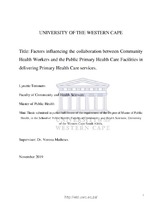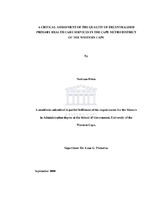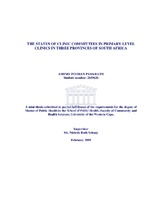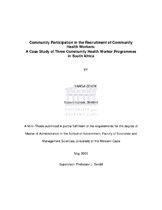Factors influencing the collaboration between community health workers and the public primary health care facilities in delivering primary health care services.
| dc.contributor.advisor | Mathews, Verona | |
| dc.contributor.author | Temmers, Lynette | |
| dc.date.accessioned | 2020-12-03T07:07:51Z | |
| dc.date.available | 2020-12-03T07:07:51Z | |
| dc.date.issued | 2019 | |
| dc.identifier.uri | http://hdl.handle.net/11394/7655 | |
| dc.description | Master of Public Health - MPH | en_US |
| dc.description.abstract | Community health workers (CHWs) are integral to improve Primary health care (PHC) coverage, utilising their unique skills within the community to make services accessible and equitable. PHC is the cornerstone of the National Health Insurance (NHI) Bill for the provision of Universal Health Care (UHC). The Department of Health (DOH) in the Western Cape, South Africa, has set priorities and requirements for the provision of funding to Non-profit organisations (NPOs) for forming coalitions with the Health Department to deliver various aspects of health care. The post-2015 agenda of the Sustainable Development Goals (SDGs) are underscored by a strong sense of intersectoral collaboration to work together to attain sufficient and sustainable progress. Collaboration between CHWs and PHC facilities is important in aligning goals and activities to ensure a comprehensive and sustainable approach to ensuring UHC | en_US |
| dc.language.iso | en | en_US |
| dc.publisher | University of Western Cape | en_US |
| dc.subject | Community health workers | en_US |
| dc.subject | Non-profit organisations | en_US |
| dc.subject | Sustainable development goals | en_US |
| dc.subject | Community based services | en_US |
| dc.subject | Primary health care | en_US |
| dc.title | Factors influencing the collaboration between community health workers and the public primary health care facilities in delivering primary health care services. | en_US |
| dc.rights.holder | University of Western Cape | en_US |




